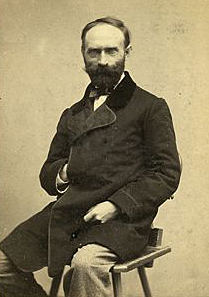Gustav Nottebohm
This article needs additional citations for verification. (January 2023) |

Martin Gustav Nottebohm (12 November 1817 – 29 October 1882) was a German musicologist, teacher and composer who spent most of his career in Vienna.[1] He is particularly celebrated for his studies of Beethoven.[2]
Life and career
[edit]Martin Gustav Nottebohm was born in Lüdenscheid, Westphalia on 12 November 1817.[1] He studied in Leipzig, where he met Mendelssohn and Schumann, and settled in Vienna in 1846.[3] In 1862 he met Brahms, who became a lifelong friend; Brahms cared for Nottebohm in his last illness and took care of the arrangements for his funeral. Nottebohm was a pioneer researcher in what are now described as 'Beethoven studies'.[4] He sought out Beethoven relics and produced an important 'thematic catalogue' of Beethoven's works. His greatest contribution, however, is probably his series of essays and commentaries on several of the musical 'sketchbooks' in which Beethoven notated and elaborated his initial ideas. The last of Nottebohm's publications on this subject appeared posthumously in 1887, edited by his former pupil Mandyczewski.[3] Nottebohm died on 29 October 1882 in Graz.[1]
Writing of Nottebohm's investigations into Beethoven's sketches, the later Beethoven scholar Joseph Kerman evaluated him in the following terms: "He made some mistakes, but it is to be doubted whether many musical scholars have maintained so high a standard of accuracy and objectivity, and so sharp a sense of the relevant, in treating a similar mass of difficult material".
Nottebohm's scholarly efforts were not confined to Beethoven, however. He published a thematic catalogue of Schubert's works and was an avid collector of Baroque and pre-Baroque music both vocal and instrumental. Brahms inherited some of his collection and bequeathed it, along with his own library, to the Gesellschaft der Musikfreunde in Vienna.
Nottebohm's own compositions were mainly in the fields of chamber and piano music. The latter includes a set of Variations on a Sarabande of J.S. Bach for piano duet, which he often performed with Brahms. In a letter to Heinrich von Herzogenberg dated 20 August 1876, Brahms numbers Nottebohm (in the same sentence with Schumann) among the modern practitioners of variation form.
References
[edit]- ^ a b c Johnson, Douglas (2001). "Nottebohm, (Martin) Gustav". Grove Music Online (8th ed.). Oxford University Press. doi:10.1093/gmo/9781561592630.article.20133. ISBN 978-1-56159-263-0. (subscription or UK public library membership required)
- ^ "Obituary: Gustav Nottebohm". The Musical Times and Singing Class Circular. 23 (478): 675. 1882-12-01. JSTOR 3358402 – via JSTOR.
- ^ a b "V. Gustav Nottebohm (1817-1882)". Boston University Center for Beethoven Research. Retrieved 2024-01-30.
- ^ "Case 1 - The Late Sketches and Autographs of Beethoven". The University of Chicago Library. Retrieved 2024-01-30.
External links
[edit]- Free scores by Gustav Nottebohm at the International Music Score Library Project (IMSLP)
- Literature by and about Gustav Nottebohm in the German National Library catalogue
- 1817 births
- 1882 deaths
- 19th-century German classical composers
- 19th-century German classical pianists
- 19th-century German musicians
- 19th-century German male musicians
- Beethoven scholars
- German classical pianists
- German male classical pianists
- German male classical composers
- German pianists
- German male pianists
- German Romantic composers
- People from the Province of Westphalia
- Schubert scholars
- 19th-century German musicologists
